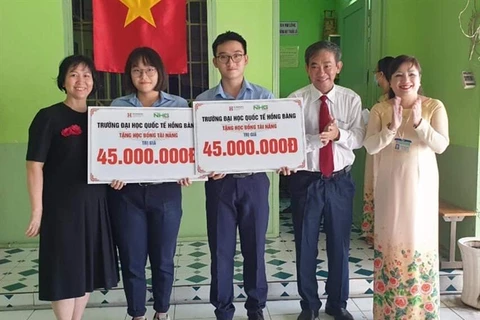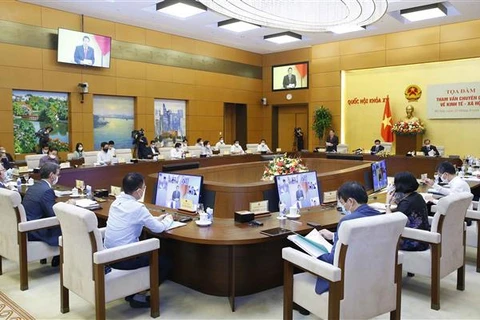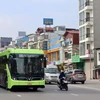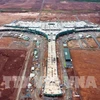Hanoi (VNA) – A cash assistance programme and faster provision of relief for people with disadvantages caused by the COVID-19 pandemic are among the proposals submitted by experts at a consultation held in Hanoi on September 27.
The event, organised by the National Assembly (NA) Office and the parliament’s Committee for Economic Affairs, was chaired by NA Chairman Vuong Dinh Hue and attended by many leading Vietnamese and foreign experts.
Terence Jones, UNDP Resident Representative, a.i., said Vietnam has introduced two fiscal measures since the beginning of the pandemic. Resolution 42/NQ-CP on supporting people affected by COVID-19 was issued in April 2020 and included a support package of 62 trillion VND (2.7 billion USD) to aid 20 million workers who had lost jobs due to the pandemic. A new 26 trillion VND support package was announced on July 1, 2021 to help workers affected by lockdowns and social distancing during the most recent wave of infections (Resolution 68/NQ-CP).
The Government has taken timely action to reduce the suffering of households that are without income due to loss of employment or earnings from self-employment, he said.
However, Jones noted, there is evidence that the support package is neither large enough, nor broad enough in scope, to protect vulnerable households from income loss resulting from lockdowns and social distancing.
He recommended a cash assistance programme of 5 percent of quarterly GDP (or approximately 77 trillion VND) be disbursed over the final months of 2021. The multiplier effect of additional consumption spending is greater than one, which means that a 77 trillion VND package would have a much larger impact on total private consumption and national output.
To achieve the twin objectives of supporting vulnerable households and stimulating economic growth, the cash assistance programme should be launched as quickly as possible, according to the Acting UNDP Resident Representative.
He held that in addition to delivering immediate support, preparations must also be made for medium-term programmes to sustain growth and private consumption if necessary. Supplemental programmes could address issues that cannot be managed in the short term.
At the consultation, Can Van Luc, Chief Economist at BIDV and member of the National Advisory Council on Financial and Monetary Policies, said to cope with the pandemic’s impacts, Vietnam issued four aid packages with the announced total value of some 1.1 quadrillion VND. However, the Government and credit institutions have just committed to providing about 184.7 trillion VND, equivalent to 2.94 percent of last year’s GDP.
The implementation of fiscal aid and social security packages remains sluggish, with only about 46 percent of the fiscal aid package and 63 percent of the social security one already disbursed, which has partly affected the effectiveness of support of enterprises and people, he noted.
Pointing out causes of this problem, he called for prompt and drastic implementation of the launched support packages, elaborating that the Government should quickly make review and preliminary assessment and immediately address obstacles to the deployment.
The Government should consider more relief packages worth nearly 40 trillion VND, equivalent to 0.62 percent of the 2020 GDP. It is also necessary to enhance enterprises’ access to capital and liquidity support. Besides, the State Bank of Vietnam should flexibly adjust credit growth limits for credit institutions so that these organisations have more resources for reducing interest rates and supplying credit to aid economic recovery, according to Luc.
Strategies and plans for pandemic prevention and control as well as socio-economic development in the new normal should be devised early, the expert said, adding that it is necessary to have new growth drivers and ensure macro-economic stability in order to capitalise on recovery chances and control risks.
He also suggested the NA and the Government soon build a legal corridor for managing and developing the digital economy, society, and administration, and that the Government should step up economic restructuring to mobilise and allocate resources more effectively./.
The event, organised by the National Assembly (NA) Office and the parliament’s Committee for Economic Affairs, was chaired by NA Chairman Vuong Dinh Hue and attended by many leading Vietnamese and foreign experts.
Terence Jones, UNDP Resident Representative, a.i., said Vietnam has introduced two fiscal measures since the beginning of the pandemic. Resolution 42/NQ-CP on supporting people affected by COVID-19 was issued in April 2020 and included a support package of 62 trillion VND (2.7 billion USD) to aid 20 million workers who had lost jobs due to the pandemic. A new 26 trillion VND support package was announced on July 1, 2021 to help workers affected by lockdowns and social distancing during the most recent wave of infections (Resolution 68/NQ-CP).
The Government has taken timely action to reduce the suffering of households that are without income due to loss of employment or earnings from self-employment, he said.
However, Jones noted, there is evidence that the support package is neither large enough, nor broad enough in scope, to protect vulnerable households from income loss resulting from lockdowns and social distancing.
He recommended a cash assistance programme of 5 percent of quarterly GDP (or approximately 77 trillion VND) be disbursed over the final months of 2021. The multiplier effect of additional consumption spending is greater than one, which means that a 77 trillion VND package would have a much larger impact on total private consumption and national output.
To achieve the twin objectives of supporting vulnerable households and stimulating economic growth, the cash assistance programme should be launched as quickly as possible, according to the Acting UNDP Resident Representative.
He held that in addition to delivering immediate support, preparations must also be made for medium-term programmes to sustain growth and private consumption if necessary. Supplemental programmes could address issues that cannot be managed in the short term.
At the consultation, Can Van Luc, Chief Economist at BIDV and member of the National Advisory Council on Financial and Monetary Policies, said to cope with the pandemic’s impacts, Vietnam issued four aid packages with the announced total value of some 1.1 quadrillion VND. However, the Government and credit institutions have just committed to providing about 184.7 trillion VND, equivalent to 2.94 percent of last year’s GDP.
The implementation of fiscal aid and social security packages remains sluggish, with only about 46 percent of the fiscal aid package and 63 percent of the social security one already disbursed, which has partly affected the effectiveness of support of enterprises and people, he noted.
Pointing out causes of this problem, he called for prompt and drastic implementation of the launched support packages, elaborating that the Government should quickly make review and preliminary assessment and immediately address obstacles to the deployment.
The Government should consider more relief packages worth nearly 40 trillion VND, equivalent to 0.62 percent of the 2020 GDP. It is also necessary to enhance enterprises’ access to capital and liquidity support. Besides, the State Bank of Vietnam should flexibly adjust credit growth limits for credit institutions so that these organisations have more resources for reducing interest rates and supplying credit to aid economic recovery, according to Luc.
Strategies and plans for pandemic prevention and control as well as socio-economic development in the new normal should be devised early, the expert said, adding that it is necessary to have new growth drivers and ensure macro-economic stability in order to capitalise on recovery chances and control risks.
He also suggested the NA and the Government soon build a legal corridor for managing and developing the digital economy, society, and administration, and that the Government should step up economic restructuring to mobilise and allocate resources more effectively./.
VNA
























